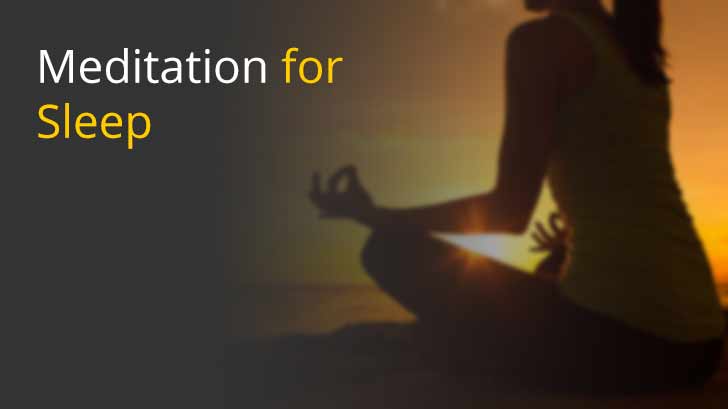- Home
- Meditation
- Sleep
-
Customer Care 9999 091 091
- Consult Now
-
Notifications
-

Meditation for sleep? Yes, it's a much needed practice especially for those who have trouble falling asleep at night. People in today's society are leading a constant busy life with a lot of mental stress that may ruin our sleeping habits and ultimately lead to poor health. Healthy sleep has to do more with the quality of rest than the quantity of hours. You’ll be glad to know that sleep meditation helps create the inner conditions needed for a truly restful night. It’s simple, when we settle the mind, we rest the body, and that restfulness is what makes it easier to wind down and drift off to a peaceful and sound sleep.
Many would agree that the tendency to get caught up in mind-chatter is perhaps the strongest around bedtime, when we suddenly stop and be still. Meditation is practice you would like to try for sure to help you feel more at ease when you hit the bed.
Meditation trains our mind to ignore random thoughts and be more aware at the present moment. Meditation for sleep is a specific guided experience that offers a natural sleep aid all on its own by allowing us to let go of everything that's happened or said or heard in the day so that we can rest the mind while resting the body at the same time.
While working through sleep meditation, you may discover several new tools and techniques to help relax the body and mind and let go of the day, easing into restfulness.
According to science, meditation helps lower the heart rate by activating the parasympathetic nervous system, which helps slower the heart rate and slows down breathing.
1. Mindfulness meditation
Mindfulness meditation is one of the most popular methods for sleep, which can be performed both day or night. This practice requires you to pay attention to your experience and environment. You can focus on your breathing or the way your body feels. With mindfulness meditation, you become more aware of your inner thoughts and more skilled at letting go distractions without affecting your calm state. By learning to deal effectively with distraction, you have the chance of training your mind off to better sleep.
2. Affirmation meditation
Similar to mindfulness, in this type of meditation, you focus your attention on one specific thing. Instead of focusing on the breath, we concentrate our attention to whatever distractions are keeping us awake with a positive affirmation such as “I am at peace”, “My body is calm”, “My mind is at ease”, “At this moment, I breathe deeply”, etc. You can choose affirmations of any kind that is significant to you or you could even use a mantra. These positive affirmations get deeply anchored in your subconscious mind as you sleep. They also help you fall asleep faster.
3. Guided meditation
In guided sleep meditation, an instructor leads and guides you throughout the meditation practice. Sometimes listening to a meditation teacher is what you need to help you fall asleep. For instance, they may lead you through guided imagery, asking you to imagine a series of relaxing images.
You can practice guided meditation with a personal instructor, as part of a class, or by using a recording on a digital device.
Any Meditation can take practice to master. Try starting with just a few minutes before bed and gradually work your way up with the duration.
You must be aware that sleeping for less than seven hours per night increases the risk of heart disease, diabetes, unhealthy eating habits that can lead to other chronic illnesses. Additionally, sleep deprivation can cause impairments in short and long term memory, attention, decision making, and reaction time.
Guided sleep meditation helps you suppress swirling thoughts and help to rest your mind. It relaxes your body, and calms and slows your mind down to help prepare you for sleep. Sleep meditation at night also has its benefits at daytime as you feel good and rejuvenated during the day.
Increased and better sleep on the other hand, can offer a plethora of health benefits. It can lower levels of stress, improve mental clarity and memory. Improved sleep also encourages better eating habits and body weight management. A good sleep is also linked with providing a greater sense of well being.
If you have insomnia or difficulty falling asleep, then meditations for sleep are known to improve not just the quality but the efficiency of sleep. Meditation before bed can help you to fall asleep faster and you are more likely to get a more sound sleep too.